
Venezuelan Embassy Opens its Doors May 5th for ‘Passport DC’
The Embassy of the Bolivarian Republic of Venezuela to the U.S. will open its doors to the community tomorrow Saturday, May 5, to showcase Venezuelan culture and traditions as part of Passport DC, an annual event featuring global culture through concerts and other activities held at the diplomatic missions in Washington.
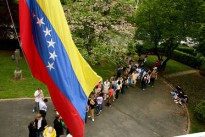
From 10 a.m. to 4 p.m., the Residence of the Ambassador of Venezuela and the adjacent Bolivarian Hall will be open to the public. Guests can expect dance, music, refreshments, special activities for children, and an atmosphere of fun and entertainment.
On display will be various works of art, including paintings by recognized Venezuelan artists that are part of the collection of the official residence. A video will also be shown in the Bolivarian Hall about tourist attractions in the country, and of course, the traditional and very refreshing sugar cane-based drink, papelón con limón, will be served.
Passport DC is a month-long event organized by Cultural Tourism, an independent coalition of more than 230 cultural organizations. Seventy embassies are joining the festivities this year, the fifth year of the event. This is the fourth year that Venezuela has participated. Last year, the Bolivarian Hall welcomed over 3,500 people.
Please visit us on Facebook or Twitter for more on Venezuela’s participation in Passport DC.
What: Passport DC’s “Around the World Embassy Tour”
Where: Venezuelan Ambassador’s Residence (2443 Massachusetts Ave., NW, Washington DC 20008)
When: May 5, 2012 from 10 a.m. to 4 p.m.
Venezuela’s Citgo Petroleum Corp. Gives Back to the Community in Atlanta
A lubricants plant in Atlanta that is part of CITGO Petroleum Corporation, the U.S.-based subsidiary of Venezuela’s national oil company PDVSA, is giving back to the community by providing local high schools with laboratory equipment to be used in science classes.

A CITGO press release states that the equipment includes over 1,500 items such as beakers, flasks, workbenches and ovens, all of which will save money for the City of Atlanta School System and benefit chemistry students at two schools: Forest Hill Academy and the Coretta Scott King Young Women’s Leadership Academy. The latter, according to its website, is a school for girls that is focused on math and science and guided by the values of “love, nonviolent social change, and scholarship.”
Brenda Rhoades, the manager of the lubricants facility in Atlanta, had this to say of the donation:
“At CITGO we are proud to give back to the community and support our local schools to ensure a promising future for our children. We know how important science education is to helping prepare students for the future – whether that is going on to college or finding a competitive job in today’s market. We hope this laboratory equipment sparks the scientific imagination of all the students involved.”
The donation was received gratefully by representatives of the Atlanta School System on Monday, April 2.
“We cannot thank Brenda and the team at the CITGO lubricants plant enough for their generous contribution to our schools,” said teacher Vincent Tolbert.
“This donation could not have been offered at a better time. We are able to provide these schools with the materials they need to enhance students’ knowledge and practicum of science while saving the district and the schools tens of thousands of dollars.”
CITGO is committed to giving back to the local communities it serves through its network of lubricants blending plants, refineries, terminals and nearly 6,300 locally owned retail locations and fast lube centers.
Based in Houston, CITGO is a refiner, transporter and marketer of transportation fuels, lubricants, petrochemicals and other industrial products. The company is an indirect wholly owned subsidiary of Petróleos de Venezuela (PDVSA), the national oil company of the Bolivarian Republic of Venezuela. For more information visit www.CITGO.com.
El Sistema USA Helping Give Children “A Bold New Future”
By now, Venezuela’s revolutionary youth music program “El Sistema” is well known abroad, but not so well known is the fact that “El Sistema” has spread like wildfire throughout the U.S., as John M. Eger points out in a Huffington Post article on April 2, 2012 entitled “There’s Something About El Sistema.”
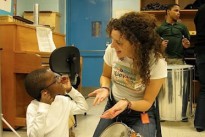
Eger, a professor of communications and public policy at San Diego State University, writes that after 35 years of helping at-risk young people in Venezuela, El Sistema is now “a global phenomenon” that is providing more than just music education, but also “a new model for social change.”
“Programs inspired by El Sistema now exist in Boston, Brooklyn, Baltimore, Los Angeles, San Antonio, San Diego, and over 50 other cities across the country,” Eger writes.
Why is El Sistema so revolutionary? According to the data, it reaches 400,000 students a year in Venezuela, and among these children, “attendance in school is higher and the dropout rate significantly lower… students who participate in El Sistema are very active members of their community, and perhaps as result of all of the above, tend to have more success entering the workplace.”
The youth orchestras inspired by El Sistema that have popped up across the U.S. appear to be improving young people’s lives, as well.
Eger quotes the president of the San Diego Youth Symphony, Dalouge Smith, who says: “El Sistema is really a new way of thinking about music education. It is about building community and productive citizens through the group experience of ensemble and orchestra.”
In Baltimore, a program called OrchKid has been able to “involve not only the parents, guardians and participating children, but also the entire community through partnerships and community events.” Its goal is to help kids “become leaders that give back and strengthen their community.”
Eger points out that El Sistema has become popular in the U.S. partly because it is so inclusive.
He writes: “All the programs take place on school sites or nearby community centers in underserved communities; and are completely free. Even the instruments, usually new, are given to every child in the program to begin their musical journey.”
According to Eger and those he interviewed, the educational model of El Sistema is extremely effective, whether in Venezuela or abroad. He concludes that the program “changes young people’s lives and prepares them for a bold new future too.”
More information about the orchestras associated with El Sistema USA is available at El Sistema.
Venezuela is the Fifth Happiest Country in the World
On March 30, the Washington Post highlighted a global happiness survey released last year by the polling firm Gallup, which found that Venezuela is the fifth happiest country in the world. According to the poll, 64 percent of Venezuelan respondents said their well-being was thriving.

The poll measured how people in 124 countries rated their lives at the current time and their expectations for the next five years.
Topping the list were Denmark (72 percent), Sweden (69 percent), Canada (69 percent), and Australia (65 percent). Finland is tied with Venezuela, sharing the fifth spot.
Venezuela is the Latin American country with the highest wellbeing, followed by Panama (11), Costa Rica (14), Brazil (15) and Mexico (19).
The classifications according to which respondents rated their wellbeing included “thriving,” “struggling,” or “suffering.” People who considered themselves to be thriving rated their lives a 7 or higher on a scale from 0 to 10.
According to the Post, the poll showed that the respondents with highest wellbeing also reported fewer health problems, less stress and sadness, and more happiness, respect and enjoyment.
Out of the 124 countries polled in 2010, the majority of residents in only 19 countries (mostly in Europe and the Americas) rated their lives “thriving.”
An article published on the website of Gallup states that the list “is largely dominated by more developed and wealthier nations, as expected given the links between wellbeing and GDP.”
Nevertheless, it states: “Global wellbeing improved little between 2009 and 2010, remaining relatively steady when Gallup groups all these countries into four major global regions: Asia, Africa, the Americas, and Europe.”
The results have a 95 percent confidence rate with a maximum margin of error of ±1.7 to ±5.7 percentage points.
Click here to see the poll results.
President of National Electoral Council: “No Electoral System on the Continent is More Audited than Ours”
The President of Venezuela’s National Electoral Council (CNE), Tibisay Lucena, gave a press conference on April 30 in which she offered details about the Integrated Authentication System, which will guard against voter fraud.
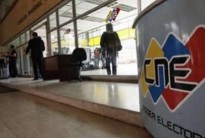
Lucena said the system is innovative and can serve as an example for other electoral systems throughout the world for its safety and reliability.
The CNE president also used the occasion to respond to statements made about the Venezuelan electoral system by U.S. President Barack Obama, saying: “there is no other electoral system on this continent that is more audited and verifiable than ours, and I hope that the elections in the U.S. are transparent, given that the majority [of state voting systems are] are manual and those that are automated aren’t audited, they are managed in some cases by businesses.”
Lucena continued: “Meanwhile in Venezuela the sovereignty rests with the people and the electoral branch that guarantees it. When we audit 54 percent of the voting machines and tables, we guarantee that those results are honest, in the U.S. that is not done.”
About the Integrated Authentication System
The Automated Authentication System is a biometric tool through which the voter can certify his or her identity at the voting machine using a national ID number and fingerprint. This is a new feature for the 2012 elections, which are to be held on October 7 (presidential) and December 16 (regional).
The CNE president said that there are three components of the new electoral system: the initial authentication phase (for which fingerprinting is used), the voting machine, and the ballot receipt (which allows for a manual cross-check of the machines).
She added that the new tool “allows for various things such as for example the security of the electoral results, the authentication of voters – that means one vote per person, we are completely sure of the process.”
Lucena said that political parties will be present at the audits that will be conducted by the electoral branch. She also noted that the new technical equipment will be “very simple, they are very easy to use.”
Almost 19 Million Venezuelans Qualified to Vote in Presidential Elections
On May 1, Venezuela’s National Electoral Council (CNE) published the preliminary electoral registry, which includes 19,119,809 voters, of which 18,858,695 are qualified to vote in the October 7 presidential elections.
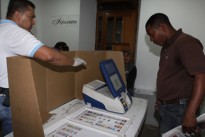
Foreign citizens are excluded from the 19 million voters, and will only be allowed to vote to for governors and state legislators, according to article 64 of the Venezuelan Constitution.
In the local and legislative elections, 17,381,601 citizens are set to vote. This figure doesn’t include Venezuelans who currently reside abroad, nor does it include foreign nationals who have lived in Venezuela for more than 10 years.
Young people enrolled in the electoral registry who will turn 18 between October 8 and December 16 are also included in the list of over 17 million people who will vote in the December 16 local elections.
Elections in the Capital District
According to a CNE press release, citizens residing in the Capital District will not vote in the regional elections because the area does not have governors nor a Regional Legislative Council.
Residents of the Capital District will instead elect a major of the Libertador Municipality and a citywide mayor, both of which will be chosen by April 2013.
New Survey: Chávez Will Win Elections in Polarized Scenario With 66% of Votes
Venezuela’s President Hugo Chávez will win the October 7 presidential elections with 66 percent of the valid votes, based on the projection of a 31.5 percent voter gap favoring the president in a polarized scenario, according to a poll conducted by the Center for Polling and Interpretation of Statistical Data 50.1 (CMIDE 50.1) from April 9-15 throughout the country, said Venezuelan journalist José Vicente Rangel.
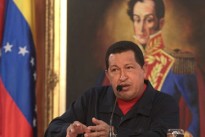
The poll was based on 1,300 interviews with citizens over 18 years of age, Rangel said during his television program Jose Vicente Hoy, on April 29. Additionally, Rangel informed that those intending to vote for Chávez reached 57.3 percent, the opposition candidate Henrique Capriles stands at 25.8 percent, while 16.9 percent of the respondents said didn’t know or didn’t answer. The gap favoring Chavez reached 31.5 percent.
In response to the question, “Do you believe that Henrique Capriles will win the October 7 elections against Hugo Chávez?” 70.7 percent said that they don’t think so, while 17.7 percent said “yes,” and 11.6 percent didn’t know or didn’t answer. The gap against Henrique Capriles reached 53 percent.
To the question “Who do you think would guarantee the country’s peace and stability as president of the Bolivarian Republic of Venezuela?” Chávez received 72.8 percent and Capriles 18.7 percent, while 8.5 percent consider didn’t know or didn’t answer. The gap favoring Chávez over the right-wing candidate reached 54.1 percent.
Meanwhile, 73.5 percent of those polled said that they approve of the job performance of President Chávez (calling it “very good,” “good” or “regular”), 18.2 percent said they have a negative opinion, and 2.3 percent said didn’t know or didn’t answer, for a gap of 61.3 percent favoring the Venezuelan president.
Rangel highlighted that 39 percent of those who said they would vote for Capriles are not confident that he will in fact win the presidential elections.
Additionally, 89 percent of upper class and middle class voters who said they would vote for Chávez believe that the Venezuelan president will guarantee peace and stability in the country.
Likewise, 78.6 percent of the population between ages 25 and 49 years (which represents 55 percent of the electorate) think that Chávez will provide higher stability and peace.
President Chavez’s Approval Rating Continues Growing
According to the latest survey conducted by the polling firm Hinterlaces, 66 percent of Venezuelans approve the job performance of Venezuelan President Hugo Chávez. The poll was conducted from April 10 to 18 of this year with a representative sample of 1,529 people.
Oscar Schemel, the president of Hinterlaces, highlighted the importance of the fact that the poll used a representative sample from across the different social classes.
“We have a data base of over 12 million telephone numbers, which allows us to have an important penetration in all the [social] strata,” he said.
The poll also highlights that two out of three Venezuelans have an excellent appreciation of the policies developed by the Bolivarian Government and its leader.
Miguel Cabrera Breaks Records in the Major Leagues
Last week was a historic one for Venezuelan baseball player Miguel Cabrera, who hit his sixth home run of the season and set a record for the most home runs ever in the history of the Detroit Tiger’s Comerica Park.

A day later, after allowing one run against the New York Yankees, Cabrera became the sixth youngest player to allow 1,000 runs in the Major Leagues. Now, after hitting his seventh home run of the season and 284th of his career, Cabrera is tied with Bob Abreu for third place among the greatest Venezuelan home run hitters in the history of the Major Leagues.
Compared to Abreu, it took Cabrera eight years, 10 months and four days less to break the record and just 59 percent of the at-bats.
Andres Galarraga has the highest record among Venezuelan players, finishing his career with nearly 400 home runs. Nevertheless, Cabrera’s performance over the last 10 seasons in the Major Leagues is unprecedented among Venezuelan players, since Galarraga was more than 36 years old when he broke the record that Cabrera is trying to break.
If Cabrera makes just 16 more home runs, the Venezuelan player will become one of just 13 batters 29 years old or younger with 300 home runs in the history of the Major Leagues, exceeding Babe Ruth and Barry Bonds. He will break this record with an OPS average of .950, a leader among Venezuelan players and the sixth highest among active players.
Venezuelan Slugger Pablo Sandoval Beats Willie Mays’ Hit Streak
On April 24, when the Cincinnati Reds beat the San Francisco Giants 9 to 2, Venezuelan player Pablo Sandoval went 3 for 1 to seal a 17-game hit streak, beating the record previously held by Willie Mays. He has since added two more to make 19 games without failing to connect with the ball.

Mays, who is now retired from Major League Baseball, is often considered the greatest player of all time. He established his 16-game hit streak in 1960. Upon hearing the news that his record had been beaten, Mays had kind words for Pablo Sandoval.
“He’s always been one of my favorites,” Mays said of the Venezuelan player.
With this achievement, Sandoval also surpasses the record previously held by a Venezuelan, Víctor Martínez.
For more information, visit our website or write us at prensa@venezuela-us.org
Follow Us: Twitter.com/VzlaEmbassyUS
Friend Us: Facebook.com/VzlaEmbassyUS